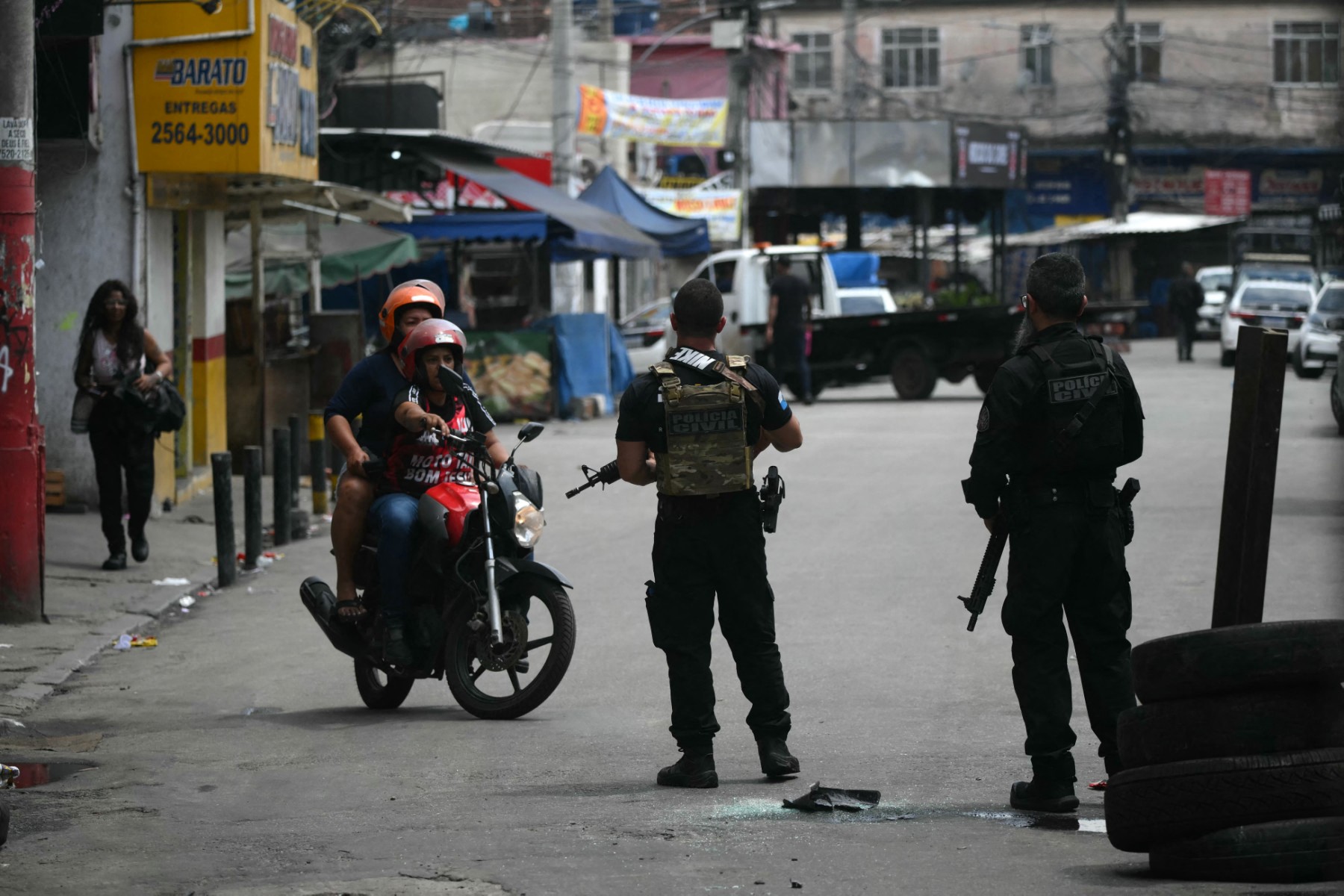IACHR condemns deaths in massive police raid in Rio de Janeiro
Inter-American Commission on Human Rights warns of the pattern of violence and racial profiling of victims
 A police officer signals a motorcyclist to reverse during the Operacao Contencao (Operation Containment) at the Vila Cruzeiro favela, in the Penha complex, in Rio de Janeiro, Brazil, on October 28, 2025. At least 2,500 agents took part in an operation to arrest drug traffickers from the Comando Vermelho (CV), which resulted in, at least, 18 suspects and several police officers dead. (Photo by Mauro PIMENTEL / AFP)
A police officer signals a motorcyclist to reverse during the Operacao Contencao (Operation Containment) at the Vila Cruzeiro favela, in the Penha complex, in Rio de Janeiro, Brazil, on October 28, 2025. At least 2,500 agents took part in an operation to arrest drug traffickers from the Comando Vermelho (CV), which resulted in, at least, 18 suspects and several police officers dead. (Photo by Mauro PIMENTEL / AFP)
The Inter-American Commission on Human Rights (IACHR) has vehemently condemned the “extremely high” number of deaths recorded during the Contenção operation, carried out on October 28 in the Penha and Alemão complexes in Rio de Janeiro. The joint raid by Civil and Military police forces resulted in 121 people dead and 113 under arrest, becoming the most lethal police raid in Brazil’s recent history.
In a press release published this Thursday (31), the IACHR, under the Organization of American States (OAS), urged the Brazilian government to immediately, diligently and independently investigate the events — including the entire chain of command —, to hold those involved accountable, and to ensure full reparations to victims and their relatives.
The IACHR highlighted that there are public reports indicating the possibility of extrajudicial executions, with several victims presenting wounds due to gunshots to the head. The Commission also brought up the social impact of the operation, which paralyzed transportation systems, schools, and healthcare services, disproportionately affecting Black and lower income populations.
Read more
Violence pattern and structural racism
The press release recalls that police lethality in Rio de Janeiro is a structural problem, already denounced in the Favela Nova Brasília case by the Inter-American Court on Human Rights and documented in multiple reports by the IACHR itself. According to data mentioned by the Commission, 703 people were killed in police raids in the state in 2024, and 470 more between January and August 2025. Out of this total, 86% of them were Black.
For the entity, these numbers show a reiterated conduct of racial profiling and the persistence of a public security model based on the excessive use of force and the criminalization of poverty.
Criticism of the “war on crime” and appeal for reforms
The IACHR acknowledged the severity of the actions of organized crime, but criticized the paradigm of the so-called “war on crime”, which “does away with victims’ humanity and is ineffective when it comes to curtailing violence”. The entity called upon Brazilian authorities to redesign their public security policies with a focus on human rights, victim-centric planning, and social participation.
The press release also mentioned measures presented by the Brazilian government, such as the ADPF of Favelas, the Draft Bill of the Constitutional Amendment on Public Security, and federal programs such as PRONASCI, the Living Black Youth Plan, and the National Project for Qualification of the Use of Force.
Commitment to truth and reparation
Finally, the Commission stated once again that the use of force should observe the principles of lawfulness, necessity, proportionality, and accountability, reiterating the need to redesign police protocols and ensure that the State Attorney’s Office should conduct investigations with independent experts.
The IACHR expressed its solidarity towards victims’ families and offered technical cooperation to the Brazilian State in actions directed towards truth, justice, reparation, and non-repetition.






